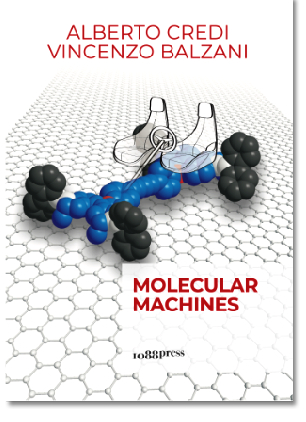
Alberto Credi – Vincenzo Balzani
Molecular Machines
ISBN: 978-88-6923-559-7 (tascabile)
ISBN: 978-88-31926-19-5 (pdf)
ISBN-A: 10.978.8831926/195 (pdf)
ISBN: 978-88-31926-23-2 (html enhanced ed.)
DOI: 10.12878/1088pressbit2020_1
edizione tascabile: € 9,00
pp. 88
formato: 12×16,5 cm
L’OPERA
The design and construction of machines and motors of molecular size is a stimulating scientific challenge and a primary objective of nanotechnology. During the past thirty years, chemists have taken up this challenge and learned how to make and operate simple nanoscale machines. Although these tiny devices are not yet part of our everyday life, we are approaching a new industrial revolution that opens up radically new perspectives for applications in catalysis, smart materials, robotics, information technology, and medical diagnostics and therapy.
GLI AUTORI
Alberto Credi is professor of Chemistry at the University of Bologna and Director of the Center for Light Activated Nanostructures (CLAN), a laboratory for the study of advanced photoactive molecular systems. His research work on the development of molecular-based devices, machines and materials capable of performing useful functions has received several awards in Italy and abroad.
Vincenzo Balzani is Professor emeritus of Chemistry at the University of Bologna. He has received numerous awards for his scientific activity, including honoris causa degrees at the Universities of Fribourg (Switzerland) and Shanghai (China), and the Nature Award for Mentoring in Science. He is deeply committed in dissemination activities focused on the relationship between science and society, and science and peace.
Copyright
1088press
Alma Mater Studiorum – Università di Bologna
Via Zamboni 33, 40126 Bologna (Italy)
ISBN: 978-88-31926-18-8
ISBN-A: 10.978.8831926/188
DOI: 10.12878/1088pressbit2020_1
Text and images are under the License Creative Commons CC BY-SA 4.0 of the Authors and 1088press, if not credited otherwise ![]() .
.
Prima edizione: aprile 2020
Edizione originale: Le macchine molecolari, aprile 2018

